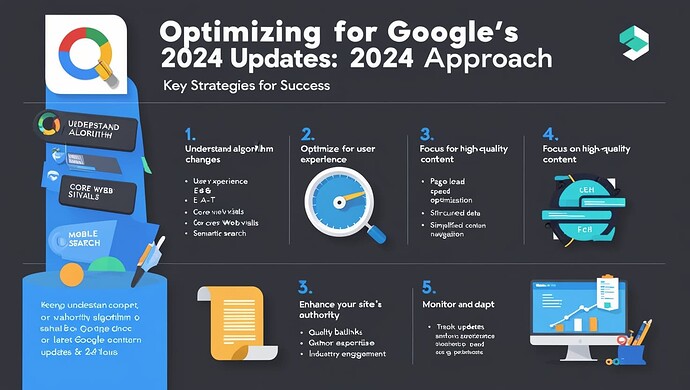As Google continues to refine its search algorithms, staying ahead of the curve is crucial for maintaining strong search engine rankings. In 2024, Google’s updates focus more than ever on user experience, content relevance, and authoritative sources. Here’s a comprehensive guide to optimizing your website for Google’s latest algorithm changes.
1. Understand the Latest Algorithm Changes
Google’s algorithms are always evolving. In 2024, some of the notable updates include:
- Enhanced User Experience Signals: Google places a high emphasis on user experience metrics such as page load speed, mobile-friendliness, and intuitive navigation.
- E-A-T (Expertise, Authoritativeness, Trustworthiness): Content that demonstrates high levels of expertise and authority, especially in YMYL (Your Money Your Life) niches, is increasingly favored.
- Core Web Vitals: Metrics like Largest Contentful Paint (LCP), First Input Delay (FID), and Cumulative Layout Shift (CLS) have become more significant in determining page rankings.
- Semantic Search Improvements: Google is better at understanding context and intent, making it crucial to focus on high-quality, relevant content.
2. Optimize for User Experience
- Improve Page Load Speed: Use tools like Google PageSpeed Insights to analyze and enhance your site’s loading time. Techniques include optimizing images, leveraging browser caching, and minimizing JavaScript.
- Mobile Optimization: Ensure your site is fully responsive and provides a seamless experience across all devices. Google prioritizes mobile-first indexing, so a mobile-friendly design is essential.
- Simplify Navigation: Create a clear and logical site structure with easy-to-use menus and internal links to help users find information quickly.
3. Focus on High-Quality Content
- Create Valuable Content: Aim to produce in-depth, well-researched content that addresses user queries comprehensively. Google rewards content that is useful and relevant to the search intent.
- Implement Structured Data: Use schema markup to help search engines understand your content better and improve your chances of appearing in rich snippets.
- Update Existing Content: Regularly review and refresh old content to keep it accurate and relevant. This can improve its performance and relevance in search results.
4. Enhance Your Site’s Authority
- Build Quality Backlinks: Focus on acquiring links from reputable and relevant sources. Avoid spammy practices and aim for natural, high-quality link-building strategies.
- Leverage Author Expertise: Showcase the credentials and expertise of content authors, especially for topics requiring specialized knowledge. This reinforces the E-A-T factor.
- Engage in Industry Communities: Participate in forums, social media, and industry events to build your brand’s authority and connect with other experts.
5. Monitor and Adapt
- Track Algorithm Updates: Stay informed about Google’s algorithm changes through reliable SEO news sources and updates from Google itself.
- Analyze Performance: Use tools like Google Analytics and Google Search Console to monitor your site’s performance and identify areas for improvement.
- Be Ready to Adapt: SEO is a dynamic field, so be prepared to adjust your strategies based on performance data and emerging trends.
Conclusion
Optimizing for Google’s latest algorithm updates requires a balanced approach that emphasizes user experience, high-quality content, and authoritative sources. By staying informed and continuously improving your site, you can better align with Google’s evolving standards and maintain a competitive edge in search rankings.
